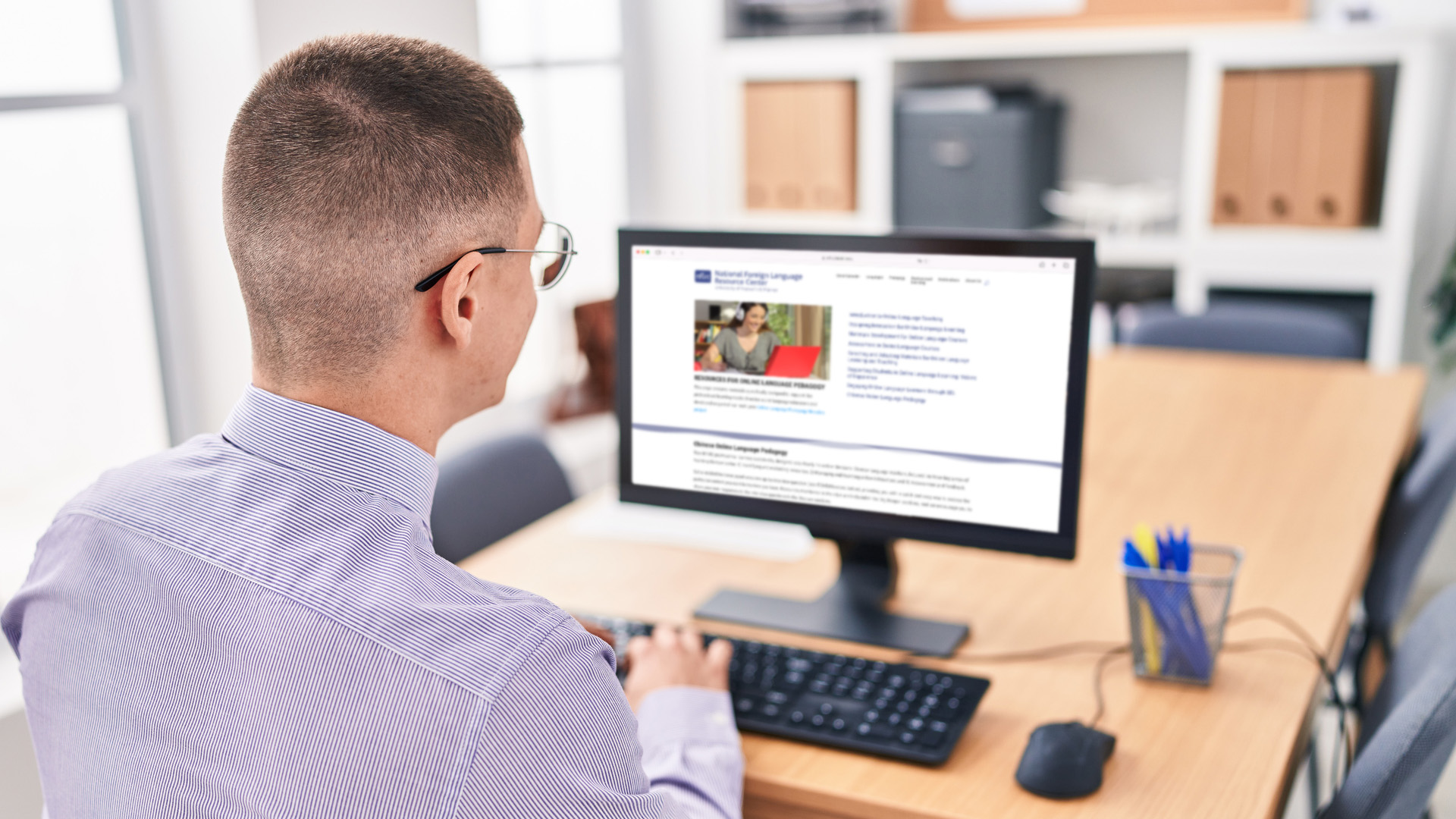Developed for in-service teachers teaching Russian online, this year’s OLP series highlights themes related to adapting materials & resources, teaching writing & reading, and learner interaction. The series consists of two parts. Part one (the summer workshop) offers three 90-minute live online panel discussions with real-time interaction, followed by Q&A, over the week of August 5 to August 9. Part two (the asynchronous online modules) – knowledge, resources, and strategies shared and generated from these live panels will then be used to develop asynchronous online modules and made available on the NFLRC website in the form of OER (open education resources).
Educators who wish to earn a Continuing Education Unit (CEU) towards maintaining their professional qualifications should attend all three live online panels and complete all the required tasks in part two.
2024 Russian Online Language Pedagogy (OLP) Summer Workshop
3-day online summer workshop (CEU credit available)
Monday, August 5 | Wednesday, August 7 | Friday, August 9
Live panel discussions in Zoom: 9:00-10:45 am Hawai‘i | 12:00-1:45 pm Pacific | 1:00-2:45 pm Mountain | 2:00-3:45 pm Central | 3:00-4:45 pm Eastern
Registration: FREE (July 31 deadline has passed)
This NFLRC professional learning opportunity, designed specifically for online Russian language teachers, will focus on three key areas of teaching Russian online*:
- Adapting materials and resources (Monday, August 5) – Dengub, Klimova, Quinn, & Shuvalova
- Teaching writing and reading in Russian (Wednesday, August 7) – Quinn & Rice
- Learner interaction (Friday, August 9) – Dengub, Klimova, Rice, & Shuvalova
* Key areas were identified by the NFLRC through a survey distributed to online Russian language teachers throughout the United States.
Panelists
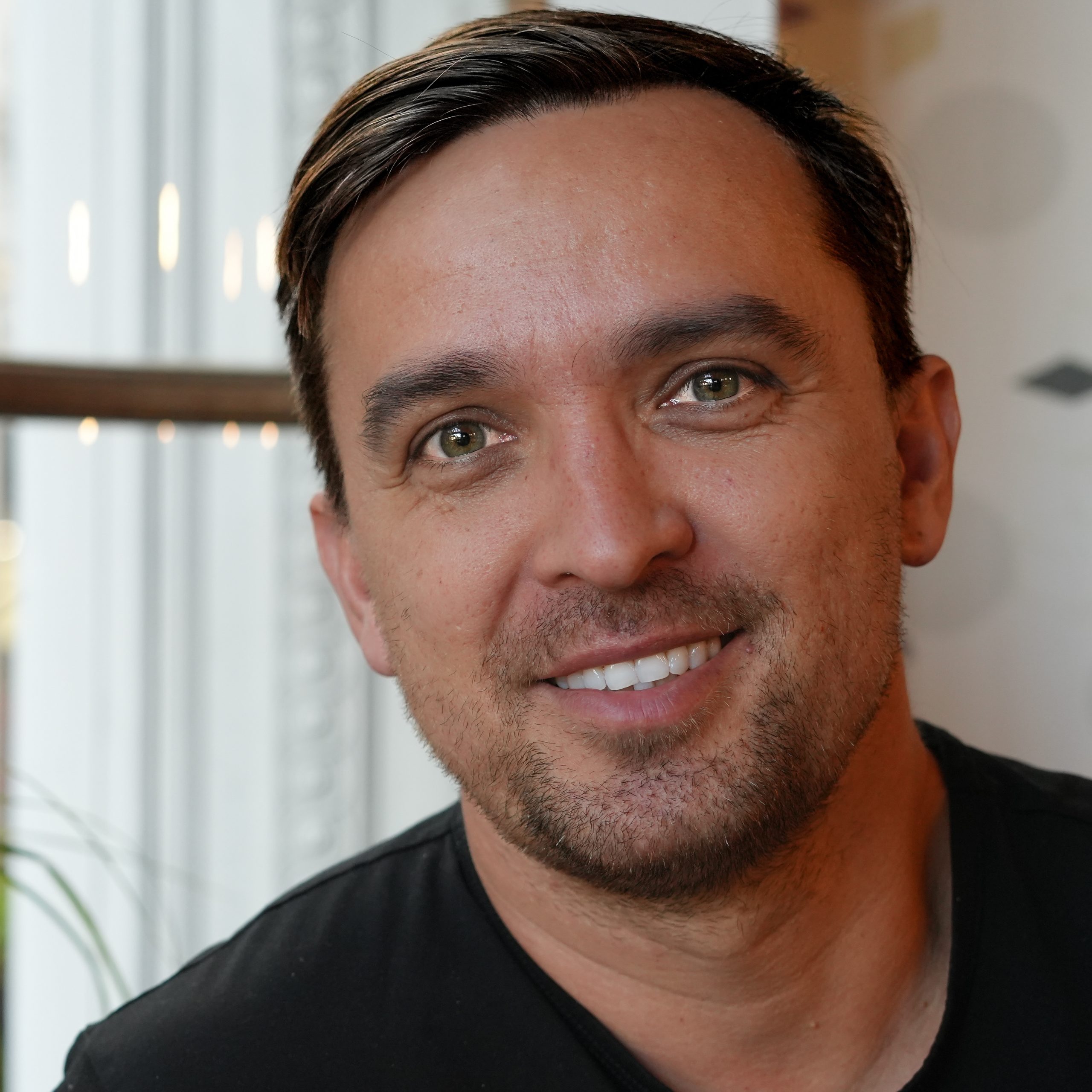
Evgeny Dengub
University of Southern California
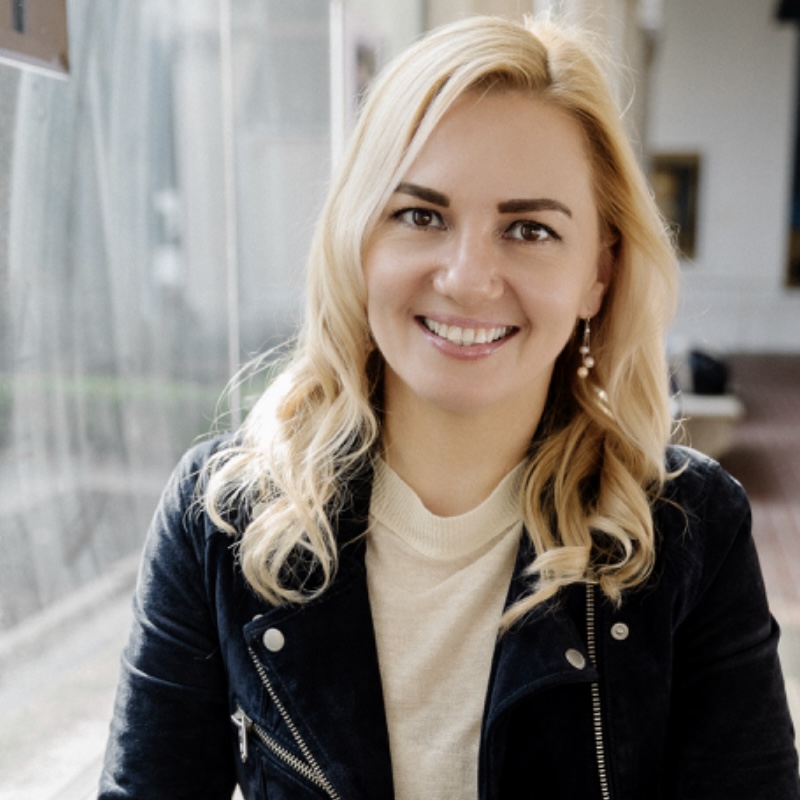
Olga Klimova
University of Pittsburgh

Shannon Donnally Quinn
Michigan State University
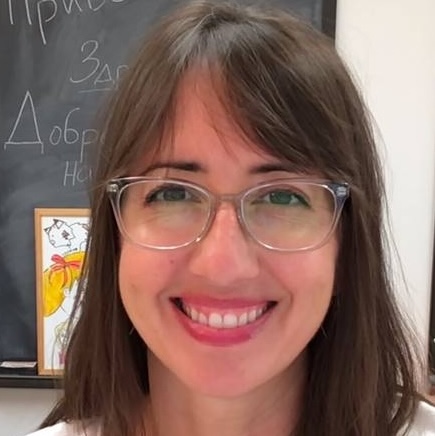
Heather Rice
University of Texas at Austin
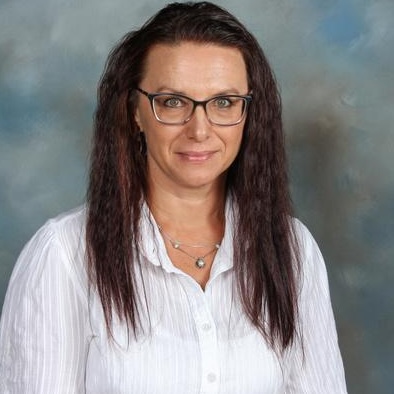
Larisa Shuvalova
University of Washington & Meridian School District, WA
Format
Three daily interactive live sessions followed by related asynchronous tasks (e.g., sharing of resources, posts related to the day’s topic, etc.), which are to be completed after each live session.
TED-Ed Lessons
We’ve divided the three panel sessions up by interview question, providing you with a quick and easy way to access the particular content you want in the time you have. Resources mentioned in the clips are included in the Dig Deeper sections, and we encourage you to share your own responses to the interview questions in the Discuss sections.

Russian OLP Panel 1, Question 1
What aspects of Russian do you think are most challenging to teach online?
Panelists: Olga Klimova, Larisa Shuvalova, Shannon Donnally Quinn, & Evgeny Dengub
Facilitator: Sarah Boutin
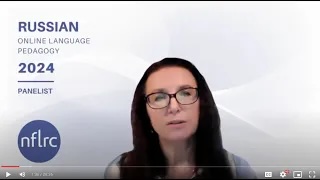
Russian OLP Panel 1, Question 2
How do we serve both heritage and non heritage learners when looking to adapt materials?
Panelists: Larisa Shuvalova, Shannon Donnally Quinn, Evgeny Dengub, & Olga Klimova
Facilitator: Sarah Boutin
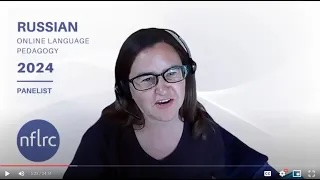
Russian OLP Panel 1, Question 3
How can we use authentic materials to add cultural lessons into online content?
Panelists: Olga Klimova, Shannon Donnally Quinn, Evgeny Dengub, & Larisa Shuvalova
Facilitator: Sarah Boutin
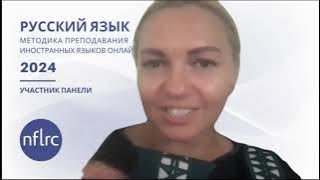
Russian OLP Panel 1, Question 4
Can you tell us about some lessons learned from using AI tools in the online Russian classroom?
Panelists: Larisa Shuvalova, Shannon Donnally Quinn, Evgeny Dengub, & Olga Klimova
Facilitator: Sarah Boutin
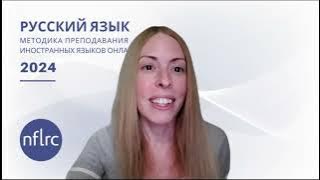
Russian OLP Panel 2, Question 1
How do you start teaching reading and writing in Russian in general? (cyrillic alphabet, sound systems, characters…)?
Panelists: Shannon Donnally Quinn & Heather Rice
Facilitator: Sarah Boutin
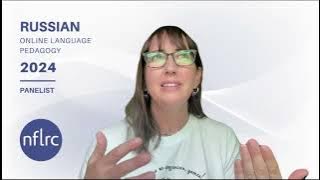
Russian OLP Panel 2, Question 2
How do you teach students the Cyrillic alphabet in an online environment?
Panelists: Heather Rice & Shannon Donnally Quinn
Facilitator: Sarah Boutin

Russian OLP Panel 2, Question 3
How much handwriting do you use and teach in the online classroom?
Panelists: Shannon Donnally Quinn & Heather Rice
Facilitator: Sarah Boutin
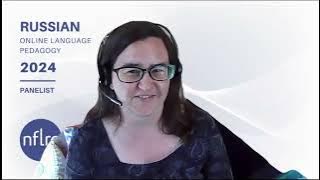
Russian OLP Panel 2, Question 4
What are some challenges students face when learning to type the Cyrillic alphabet?
Panelists: Heather Rice & Shannon Donnally Quinn
Facilitator: Sarah Boutin
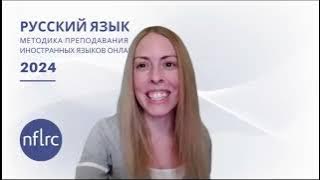
Russian OLP Panel 2, Question 5
How do you work with scaffolding when students are reading or writing?
Panelists: Shannon Donnally Quinn & Heather Rice
Facilitator: Sarah Boutin
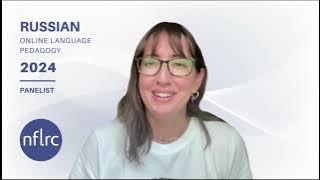
Russian OLP Panel 2, Question 6
Where are Russian students more likely to need scaffolding in an online classroom?
Panelists: Heather Rice & Shannon Donnally Quinn
Facilitator: Sarah Boutin
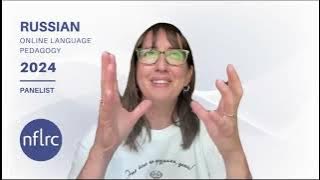
Russian OLP Panel 2, Question 7
How can teachers effectively use authentic materials in a level 1 classroom where students have no background knowledge of the language?
Panelists: Shannon Donnally Quinn & Heather Rice
Facilitator: Sarah Boutin

Russian OLP Panel 2, Question 8
What do you find students learning Russian struggle the most with when engaging in reading or writing related activities? How do you overcome these challenges?
Panelists: Shannon Donnally Quinn & Heather Rice
Facilitator: Sarah Boutin
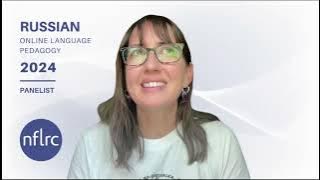
Russian OLP Panel 2, Question 9
How do you discuss the appropriate use of translators or AI with your students?
Panelists: Heather Rice & Shannon Donnally Quinn
Facilitator: Sarah Boutin
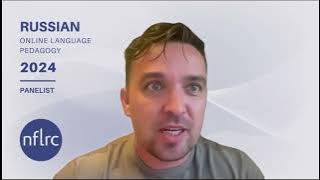
Russian OLP Panel 3, Question 1
What makes the Russian language challenging to use when fostering learner to learner interaction?
Panelists: Olga Klimova, Larisa Shuvalova, Evgeny Dengub, & Heather Rice
Facilitator: Sarah Boutin
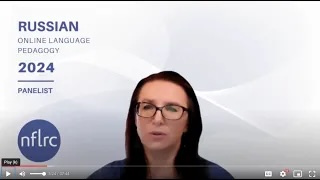
Russian OLP Panel 3, Question 2
How do you use technology or online resources to overcome those challenges?
Panelists: Larisa Shuvalova, Evgeny Dengub, Heather Rice, & Olga Klimova
Facilitator: Sarah Boutin
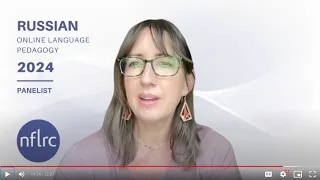
Russian OLP Panel 3, Question 3
How do you provide feedback that’s necessary to learn while encouraging students to partake in learner interaction in the online environment?
Panelists: Olga Klimova, Larisa Shuvalova, Evgeny Dengub, & Heather Rice
Facilitator: Sarah Boutin

Russian OLP Panel 3, Question 4
What kinds of things that are unique to Russian that can make giving feedback more challenging for students? How do you address this?
Panelists: Heather Rice, Olga Klimova, Evgeny Dengub, & Larisa Shuvalova
Facilitator: Sarah Boutin

Russian OLP Panel 3, Question 5
How can online Russian educators use culture to build the classroom community and foster a fun and positive online environment?
Panelists: Larisa Shuvalova, Evgeny Dengub, Olga Klimova, & Heather Rice
Facilitator: Sarah Boutin
Panel recordings
And for those who prefer to watch everything all at once, the full video recordings for all 3 panels can be found on our NFLRC YouTube channel
Shared resource links
Please note that the listing here does not suggest endorsement by the National Foreign Language Resource Center or the U.S. Department of Education. These are solely recommendations from our panelists and attendees.
Panel 1: Resources shared by panelists
- Book for poems. Contributed by Evgeny Dengub.
- City Walks Live (street walking). Contributed by Olga Klimova.
- Collection of “simple” Russian songs on Spotify. Contributed by Evgeny Dengub.
- Diverse Russian: A Multicultural Exploration (online free textbook – funded by the Less Commonly Taught and Indigenous Languages Partnership). Contributed by Shannon Donnally Quinn.
- Dollar Street (Photos of family homes and household items in different countries). Contributed by Olga Klimova
- Formative. Contributed by Larisa Shuvalova & Evgeny Dengub.
- Gather Town. Contributed by Larisa Shuvalova.
- Housing (Russian version of Zillow). Contributed by Evgeny Dengub.
- Keybr (typing practice resource). Contributed by Evgeny Dengub.
- Middlebury College Heritage Russian Language Learning Modules. Contributed by Shannon Donnally Quinn.
- Resource for contemporary plays, including shorter ones. Contributed by Evgeny Dengub.
- Resource to turn a typed text into a handwritten one. Contributed by Evgeny Dengub.
- Russian Reader (Russian short stories). Contributed by Evgeny Dengub.
- Podcast with some stories/texts suitable for 1st year students. Another one. Contributed by Evgeny Dengub.
- Virtual excursions (museums and theaters). Contributed by Olga Klimova.
- https://www.culture.ru/s/virtualnye-progulki/
- https://www.kreml.ru/about-museums/#
- https://www.culture.ru/themes/252991/virtualnyi-tur-po-muzeyam-rossii
- https://armoury-chamber.kreml.ru/virtual-tour/
- https://kosmo-museum.ru/static_pages/google-panorama
- https://teatry.tass.ru
- https://astanaopera.kz/virtual-tour
- Wordwall. Contributed by Larisa Shuvalova (example).
- Window swap. Contributed by Olga Klimova.
Other resources shared by attendees during Panel 1:
- Archive of personal stories. Contributed by Julia Denne.
- For independent work on phonetics, the resources created by Kimberly DiMattia are very helpful. I have assigned materials from the free word of the day materials and the paid Russian Sounds Library. https://www.russianpronunciationwithkira.com/. Contributed by Irina Kogel.
- Plays by Ivan Vyrypaev. Contributed by Tatiana Derugo
- Resource for learning Russian through songs (all levels). Contributed by Evgeny Pareshnev.
- Resource for cursive handwriting in Russian. Contributed by Evgeny Pareshnev.
Panel 2: Resources shared by panelists
- Anvill. Contributed by Shannon Donnally Quinn.
- FLTMAG (the online journal of IALLT) – the best way to find out about new tools, assess tools, and get new ideas. Contributed by Shannon Donnally Quinn.
- Gismeteo (Russian weather website). Contributed by Heather Rice.
- H5P – useful for adding scaffolding and supports to authentic materials. Contributed by Shannon Donnally Quinn.
- Language, Literature, Culture (LLC) Commons (funded by CERCLL). Contributed by Shannon Donnally Quinn.
- Между нами (mezhdunami.org) is a free, web-based textbook that provides a comprehensive introduction to Russian language and culture. Contributed by Shannon Donnally Quinn.
- Middlebury College Heritage Russian Language Learning Modules. Contributed by Shannon Donnally Quinn.
- Middlebury College Pre-immersion site. Contributed by Shannon Donnally Quinn.
- RAILS project (University of Wisconsin-Madison, originally funded by the Department of Education). Contributed by Shannon Donnally Quinn.
- Typing lessons. Contributed by Shannon Donnally Quinn.
- Yandex. Contributed by Shannon Donnally Quinn.
Other resources shared by attendees during Panel 2:
- Digital Transition Webinars for Educators. Contributed by Ellen Hart.
- English Grammar for Students of Russian. “I was suggesting many of my students this book for many years to understand the difference between Russian and English.” Contributed by Olga Klimova.
- “I just wanted to share 3 websites that I use to support students at the novice and intermediate levels, but can be used for all levels. One adds stress marks to texts, the other one adds letters ё, which is extremely helpful as often authentic texts do not include the letter ё, and students can’t distinguish it from the letter е. The last one is just to assess the proficiency level of the text that you would like to use in your classroom. They can be especially helpful for teaching reading skills. https://russiangram.com/, https://textometr.ru/, https://textometr.ru/yoficator“. Contributed by Olga Klimova.
- Russian typing lessons. Contributed by Ivan Savvine.
- Using Zoom annotation tools for collaboration. Contributed by Jim Yoshioka.
Panel 3: Resources shared by panelists
- American Council of Teachers of Russian. Contributed by Olga Klimova.
- Canva (for creating posters, infographics, brochures). Contributed by Olga Klimova.
- ChatGPT. Contributed by Larisa Shuvalova.
- Discord. Contributed by Olga Klimova.
- Duolingo. Contributed by Larisa Shuvalova.
- Google Slides. Contributed by Evgeny Dengub.
- Miro (free for educators). Contributed by Evgeny Dengub.
- Miro Board examples contributed by Olga Klimova:
- https://miro.com/app/board/o9J_lSXLXy0=/?share_link_id=840836485473
- https://miro.com/app/board/uXjVO_Qa4Ck=/?share_link_id=756485383861
- https://miro.com/app/board/uXjVKaX4auw=/?share_link_id=132880812973
- https://miro.com/app/board/o9J_kj3D4l0=/?share_link_id=803427583555
- https://miro.com/app/board/uXjVNuh4MVE=/?share_link_id=370841926807
- https://miro.com/app/board/uXjVOVG-0e0=/?share_link_id=731910458699
- https://miro.com/app/board/uXjVNwKCi6s=/?share_link_id=554108389411
- https://miro.com/app/board/o9J_klI7Ei8=/?share_link_id=259996053803
- Nearpod (interactive activities and assessments using iPads). Contributed by Olga Klimova.
- StoryJumper (for creating digital books). Contributed by Olga Klimova.
- VoiceThread. Contributed by Olga Klimova.
- WhatsApp. Contributed by Evgeny Dengub.
- What’s My Proficiency Level? (ACTFL). Contributed by Larisa Shuvalova.
- WordWall (spinning wheel) – ice-breaker activity. Contributed by Evgeny Dengub.
- WordWall (speaking cards) – ice-breaker activity. Contributed by Evgeny Dengub.
- Zoom polls. Contributed by Evgeny Dengub.
Hands-On Activities
As part of the requirements for the digital badge (see below), five of our badge awardees submitted some wonderful hands-on activities they’ve developed in response to the Russian OLP panel sessions. We’ve gotten permission to publish them here and share them with you. Enjoy!
- Elena Allen (North Carolina Virtual Public School): Parts of the House; School; Russian Alphabet (Magnetic Board Quiz)
- Tatiana Derugo (Brookdale Community College): Award Stickers; My Neighbor is Viktor Vasnetsov. Мой сосед – Виктор Васнецов; Неужели в России так можно? Сould it be that you can do that in Russia?
- Ilmira Dulyanova (University of South Dakota): Dative Case of Nouns and modifiers; Dative Case for Pronouns, Nouns and modifiers
- Tatyana Iverson (San Diego State University): School subjects, schedule; Russian poets; Russian painters, paintings
- Maryna Kuziakina (San Diego State University): Using Resources to Teach Russian Online; Improving Reading and Writing Skills from Online Content; Creating an Interactive Experience in the Online Environment
Products
Successful completion of this workshop (attendance in all 3 live Zoom panel sessions and completion of all asynchronous tasks by August 31) will be certified with a digital badge conferred by the National Foreign Language Resource Center (University of Hawai‘i at Mānoa). Please see Digital Badge Criteria section below for details. Badge earners may be eligible to earn a Continuing Education Unit (CEU) towards maintaining their professional qualifications.
Badges are not available to those who are not able to attend the 3-day workshop in person. Session recordings and resources will be made available after the event as OERs.
Digital Badge Criteria
The Russian OLP badge certifies that the badge recipient:
- Learned about adapting materials and resources; teaching writing and reading in Russian; and learner interaction related to teaching Russian online;
- Attended all three live Zoom panel sessions;
- Participated substantively and collegially in asynchronous tasks following each live session, including 3 posts per session in the Russian OLP Padlet and the creation and submission of three hands-on activities;
- Completed a 3-2-1 Reflection for each live session.
- Completed our Exit Survey
NOTE: See the Q&A section below for instructions on how to complete your required badge tasks.
The digital badge can be requested at the end of the Exit Survey form.
Completion Due Date: August 31, 2024.
CEU Credit
Participants who meet all the criteria listed under “Digital Badge” above can be eligible to earn continuing education unit (CEU) credit. In order to earn the CEU credit, one requirement is to fulfill a minimum of 10 contact hours during the workshop, which means participants have to attend all 3 webinar sessions (6 hrs) and participate in asynchronous tasks and reflections afterwards (4 hours).
If you are from the North Carolina Virtual Public School, you will automatically be considered for CEU credit. If you are from a school OTHER than North Carolina Virtual Public School and you wish to earn CEU credit, please provide the name, title, and contact info (phone and/or email) of the supervisor who will be responsible for approving/awarding your professional development credit when you submit your Digital Badge / CEU request form.
Completion Due Date: August 31, 2024.
Q&A
Live Zoom panel sessions
- How do I access live panel sessions in Zoom? All sessions can be accessed via the link provided to registered attendees prior to the start of the summer workshop.
- What topics will be covered during the live panel sessions? The session schedule, including the list of topics and presenters will be listed in the aforementioned email as well as on this webpage, once available.
- What should I do if I have a question about Zoom? Visit the Zoom Help Center for more information.
Asynchronous tasks (following live panels)
- What are the asynchronous tasks? The asynchronous tasks come in two parts. First, there are postings in the Russian OLP Padlet, and second, there are 3 hands-on activities (see below for details).
- How do I participate in the Russian OLP Padlet? After each live panel session, participants will respond to the day’s prompts by making posts in the Russian OLP Padlet at their leisure. This may involve discussing an aspect of the day’s content, sharing resources, and so forth. Participants should make at least three posts for each of the three session days. Be sure to include your full name with your posts, so you are appropriately credited for your contributions.
- What are the hands-on activities? You will be creating a lesson with components based on the topics and discussions from our three panel sessions. You can access the instructions for all 3 hands-on activities here.
- Are there opportunities to publish our hands-on activities? Yes, we plan on publishing some of the great hands-on activity ideas we receive on this webpage. If you would like your submissions to be considered, you can indicate so on your Digital Badge / CEU request form.
Final Project: 3-2-1 Reflection
- What is the 3-2-1 Reflection? The 3-2-1 Reflection is a brief summary report that you need to complete after each live panel session. For each one, you need to provide a summary of three things you learned, two things you plan to implement in your class, and one question that you still have.
- Where can I find the 3-2-1 Reflection and how do I create my own copy? First, go to the Reflection Template.
- How do I submit my 3-2-1 Reflection? You can submit the URL to your 3-2-1 Reflection document (or MS Word version) via our Russian OLP Digital Badge/CEU request form..
Exit Survey / Digital Badge Request Form
When you have completed all requirements for the Russian OLP Digital Badge / CEU (see above criteria), the last step involves completing the Exit Survey. After you submit your exit survey responses, a confirmation message will appear on the next page, containing the link to the Russian OLP Digital Badge / CEU Request form, which you can complete if you are pursuing either.

